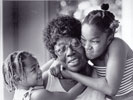A tribute to two women warriors
By
Dianne Mathiowetz
Published Apr 20, 2005 3:45 PM
The Atlanta community and
the progressive movement are mourning the deaths of two of the city’s most
passionate and determined leaders for economic and social justice.
On
March 14, Ethel Mae Mathews died at her home of heart failure at the age of 72.
Born in Loachapoka, Ala., to a sharecropper family and married at the age of 12,
her early experiences with the poverty and racism at the hands of “Mr.
Charley”—the term that signified all the indignities and cruelties
of the segregated South—shaped her deep hatred of injustice.
In
1950, she moved alone to Atlanta to raise her four children. It was there, she
said, that she discovered that she had rights when she met community activists
associated with the Emmaus House. As president of the Atlanta Welfare Rights
Organization, Mathews became a loud and persistent voice for the poor, the
elderly and children. For decades, she was a leader and participant in countless
marches and sit-ins; stood in front of bulldozers to stop the destruction of a
community center; confronted mayors, governors and presidents over their
policies that hurt the poor.
This writer happened to be in a food stamp
office in August 1975 when in marched Mrs. Mathews and dozens of others
demanding to see the program director over the difficulties that were being
placed in the way of people receiving what was rightfully theirs. That encounter
began a long alliance and collaboration between Mathews, the Atlanta Welfare
Rights Organization, the Emmaus House and Workers World Party. Together, the
three groups worked together on numerous campaigns for housing, health care and
against cutbacks of social services. Mrs. Mathews spoke at rallies against
apartheid in South Africa and the wars in El Salvador, Nicaragua and
Iraq.
Ethel Mae Mathews was a fierce fighter for poor people and workers.
She always knew which side she was on.
Carrie Lue Morris, president of the
All-Peoples Congress chapter in Atlanta, an activist for senior citizens and the
poor who could be seen and heard at public hearings, community meetings, marches
and demo nstrations for decades, died of a massive heart attack on March 29. She
was 74.
Morris was born in Watkinsville, Ga. She often recalled the
intimidating presence of the Ku Klux Klan in the rural community where her
extensive family lived. She and her five young children came to Atlanta where
she worked long hours as a low-paid home health care worker.
She joined
the rapidly growing civil rights movement and found her voice to challenge all
that she found unjust. Morris never stop ped advocating “taking it to the
streets.”
In the 1970s,she became an activist in the emerging
tenants’ councils being formed in housing projects. As president of Harris
Homes, she fought for decent housing for the poor and against cutbacks in social
services. She, along with a number of other Black women, including Ethel
Mathews, became a powerful force in the city, not afraid to confront government
officials and big business leaders.
Following the election of Ronald
Reagan in 1980, Morris helped organize buses to a march on the Pentagon that
brought 100,000 people to D.C. to say no to cutbacks, war and racism.
She
became president of the Atlanta chapter of the All-Peoples Congress. Years of
intense activity followed with the APC organizing against fare hikes, utility
increases, and cutbacks at Grady Hospital. The APC mobilized against marches of
the Ku Klux Klan in College Park and twice in Atlanta, where masses of people
chased the racists out of town.
With her grandchildren in hand, Morris
picketed presidents, attended countless organizing meetings, distributed fliers
and collected petitions. Morris and the APC went to numerous national marches in
D.C. against war, the Klan marching in Washington, and for women’s rights.
She always brought delicious food for the people on the bus. Morris attended
local and national programs and conferences org anized by Workers World Party
and was valued as a strong ally and friend in the struggle.
In recent
years, health problems prevented her from marching on long demonstrations. So
instead she rode in the sound truck and led the chants at protests for Mumia
Abu-Jamal in Atlanta or worked the literature tables at the October 2003
national demonstration against the war on Iraq.
Carrie Morris had a
booming voice, a feisty manner and a warm and caring personality. She loved to
sing; she loved her family, her friends, her people.
Morris was the last
speaker at the fun eral of her friend and ally, Ethel Mae Mathews, two weeks
before her own death. She called for the renewal of a people’s movement
that took their power to the streets.
The struggle continues—that is
the legacy of these two warrior women.
Articles copyright 1995-2012 Workers World.
Verbatim copying and distribution of this entire article is permitted in any medium without royalty provided this notice is preserved.
Workers World, 55 W. 17 St., NY, NY 10011
Email:
[email protected]
Subscribe
[email protected]
Support independent news
DONATE


